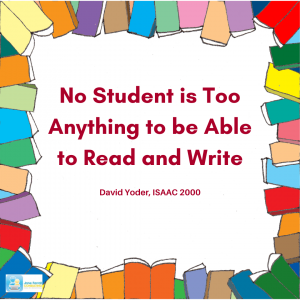Last week I had a wonderful experience. I’ve been smiling ever since. Then yesterday I read a blog post by David Koppenhaver and decided that I needed to write about my experience.
One of my favourite quotes is from Dr David Yoder. “No student is too anything to be able to read and write.” I firmly believe this – and the longer I work the more evidence I have to support it.

Just over 10 years ago I met a young man – Tom. He was 17 years old and in his penultimate year at high school. Tom was referred to me for an Augmentative and Alternative Communication (AAC) evaluation. Tom was referred for an AAC evaluation because he has complex communication needs as well as cerebral palsy spastic quadriplegia. He speaks – but is generally only understood by those familiar with him within context. Every day, even with familiar people, he has communication breakdowns where they don’t understand his message via speech. As Tom was approaching the end of his schooling, his team became concerned about his communication needs after school. How was he going to get his message across with the wide range of unfamiliar people he was going to meet?
So – we completed the evaluation, put a lot of recommendations into place including a low technology communication folder and a high technology system. Tom was most interested in the high technology system – but this required a lot of groundwork as he needed to learn to use a switch and scanning to control it. Our wonderful Occupational Therapist, Leah, and myself worked with him and members of his support team every two weeks – practicing switching and communication goals – and by the time he left school he could use his communication device to repair communication breakdowns sometimes using one or two keywords, although he rarely used it as his first choice for communication.
During the course of the AAC evaluation it became clear that Tom’s literacy skills were very early. We didn’t formally evaluate them – but he was unable to write or read common words. Our evaluation mostly looked at literacy in terms of whether spelling words out could be part of Tom’s communication system. At the time we had a discussion about literacy – but Tom didn’t want to talk about working on literacy because he felt he was no good at it. In addition, he and his team felt that it was more important for him to get through the volume of work the last two years of school involved with a scribe and other accommodations.
In late 2012 I saw Tom again. His mother contacted me to request another evaluation – but this time for literacy. I was delighted to see him again. Tom himself had requested the literacy evaluation because he wanted to learn to read and write. He had realised that his literacy skills were a barrier in many ways – and, most importantly, a social barrier. His friends and his siblings were communicating via Facebook every day but he was unable to participate.
In the time since I had seen him, his switching skills had improved greatly. He participates in a custom post-school options program, joining some groups but also doing some solo sessions on areas of interest with a program facilitator. One of these group sessions had been in computing – and he was now using a switch to control many aspects of a computer. He still had the same AAC system I had recommended 10 years before – but it was rarely used.
I spent some great sessions with Tom and with his family and some of his program facilitators. I assessed his literacy skills and we talked about his overall needs. Tom and his program facilitators were keen to look at AAC again due to the many communication breakdowns he was experiencing – so we spent some time looking at that and getting it working and talking about important strategies, including aided language, updating vocabulary and practicing! One of his program facilitators has a niece with CCN and was very aware of the importance of aided language and began doing lots of aided language – and encouraging everyone else to do so.
Tom’s literacy skills were still emergent. On a conventional literacy assessment (I used a modified version of the Qualitative Reading Inventory as suggested by the Centre for Literacy and Disability Studies) he was unable to complete tasks at a pre-primer level.
I then looked at his “emergent” literacy skills that are the foundation for conventional literacy development. His Concepts about Print (which were very good), his letter identification (which was 100% accurate in both upper and lower case), his phonological awareness (where he had some small difficulties) and collected a writing sample. For the writing sample, he wrote “Drama is my favourite” – and what he actually wrote was “Dak in ma fat”. He had the first letter correct in each word, indicating to me that he was at early phonetic cue stage.
Overall, his foundation or emergent literacy skills were very good – and so we started doing balanced literacy teaching aimed at early conventional literacy skills. I wrote a program that his program facilitators completed with him twice a week and his family did extra sessions when they could. I reviewed progress about 6 months later and things were going well although they hadn’t seen a lot of progress at that stage.
Last week, I reviewed Tom’s progress again at 12 months. Tom had made great progress. He is now reading passages with comprehension at a pre-primer level. He is excited about his literacy progress and really enjoying the program. He has joined Facebook and will often write a status update as part of his regular writing – he writes it into Clicker 6 and then it is edited before being posted. For his writing sample in the review last week he wrote “The best thing was art at Gateway” and what he actually wrote was “the beay thes was at iweay”. He is now a conventional reader and writer – and well on his way to developing further literacy skills.
In addition, he has been using his AAC system regularly – and I’m pleased to report that we are also putting in an application for a new system as he has outgrown his current system. He is now combining several icons to speak (instead of one or two key icons) and at one stage in our appointment combined 10 icons to REALLY get his point across.
It is so exciting for Tom – he is justifiably proud of his new skills and determined to work harder than ever. His team and family are wonderful – and the consistent work and input has definitely paid off and will continue to do so. And more than anything I just want to agree with David Koppenhaver – it is never too late to learn to read and write and Tom is yet another example of this.
“I choose to believe that people learn what they are taught, if teachers figure out how to teach them in ways that make sense to the students. I choose not to predetermine students’ learning success or failure. I take the blame when my students fail to learn, and I try to do better tomorrow and tomorrow and tomorrow.” Koppenhaver, 2013 www.litdis.com
And if students learn because we have used good instruction I’ll celebrate with them!


Carole
Jane
Pingback: Too late to learn to read & write? No! | AA...
Amanda
Pingback: Too late to learn to read & write? No! | Co...
Jo
Jane
Gail